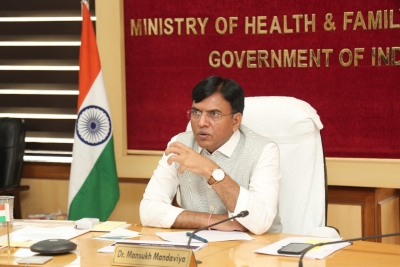New Delhi, March 22 : Union Health Minister Mansukh Mandaviya on Tuesday said India is willing to offer its robust vaccine manufacturing industry for developing vaccines for BRICS (Brazil, Russia, India, China and South Africa) countries as well as the world.
“India has one of the world’s largest vaccine manufacturing industries which supplies vaccines to more than 150 countries and meets 65-70 per cent of the WHO’s vaccine requirements,” he said.
Mandaviya launched the BRICS Vaccine R&D Centre and Workshop on Vaccine Cooperation through video-conference here.
With the commitment of BRICS countries towards strengthening their cooperation in various fields, special emphasis was given to vaccine research and development.
In this regard, a BRICS Vaccine R&D Centre was proposed to be established in 2018 Johannesburg Declaration.
Over the years and especially throughout the pandemic, this process was expedited and finally in New Delhi, Declaration of XIII BRICS Summit, leaders reiterated their commitment towards the early launch of BRICS Vaccine R&D Centre in virtual format.
Mandaviya said that the Centre will help to pool together complementary advantages of BRICS countries in vaccine research and development and boost the capacity of BRICS countries to prevent and control infectious diseases and provide timely help to other developing countries in need.
“The Centre will be instrumental in streamlining vaccination resources and facilitate equitable access to safe and efficacious Covid-19 vaccines,” said Mandaviya.
“BRICS Vaccine R&D Centre is a welcome initiative to collaborate with countries, share experiences, build collaborations for mutual benefits and accelerate development of vaccine of public health importance.This will enable saving lives and livelihood to propel us towards economic recovery for the citizens of BRICS countries and the world,” he added.
Mandaviya said that WHO’s R&D blueprint and International Health Regulations should be the guiding principles for this centre, and further proposed that “BRICS countries should work together to support endeavours such as ACT-A, COVAX, CEPI, etc., to achieve the WHO’s laid target of vaccinating 70 per cent of the world’s population with Covid-19 vaccines by mid-2022”.
The minister also added that apart from pandemic and health emergencies, there is an ample scope of collaboration among countries like in the field of vaccine preventable diseases with high morbidity and mortality and for those diseases with no vaccines available currently such as AIDS, TB, etc.
“India has also so far approved 9 vaccines for Covid-19 emergency use, of which 5 are indigenous.This also involves world’s first of a kind mRNA vaccine Gennova that has been developed indigenously, and produced outside WHO transfer technology programme.”
He said that the vaccine industry in India functions in a dual mode — De-novo product development i.e., within the country and technology transfer through local-global partnership.
avr/pgh
#India #Delhi #China #Delhi #New Delhi #Russia #Johannesburg #Covid-19







